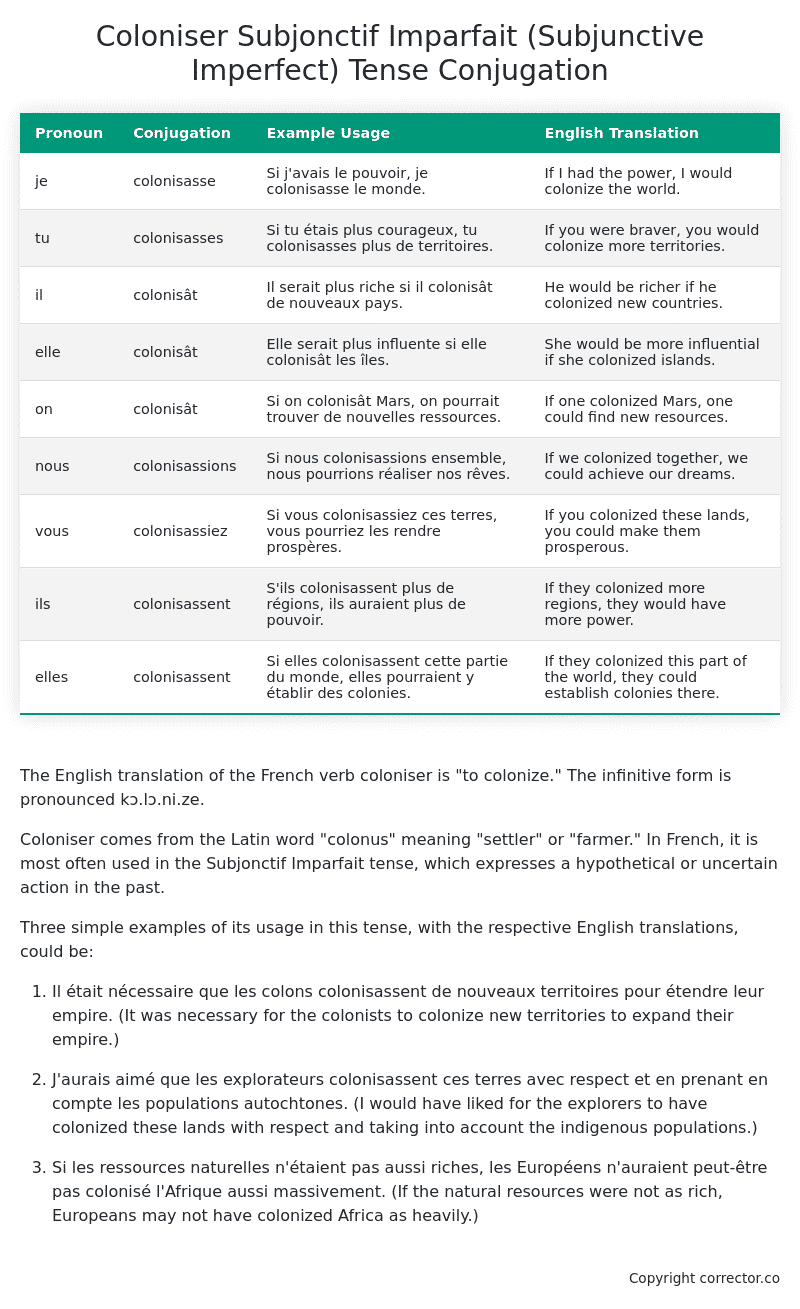Subjonctif Imparfait (Subjunctive Imperfect) Tense Conjugation of the French Verb coloniser
Introduction to the verb coloniser
The English translation of the French verb coloniser is “to colonize.” The infinitive form is pronounced kɔ.lɔ.ni.ze.
Coloniser comes from the Latin word “colonus” meaning “settler” or “farmer.” In French, it is most often used in the Subjonctif Imparfait tense, which expresses a hypothetical or uncertain action in the past.
Three simple examples of its usage in this tense, with the respective English translations, could be:
-
Il était nécessaire que les colons colonisassent de nouveaux territoires pour étendre leur empire. (It was necessary for the colonists to colonize new territories to expand their empire.)
-
J’aurais aimé que les explorateurs colonisassent ces terres avec respect et en prenant en compte les populations autochtones. (I would have liked for the explorers to have colonized these lands with respect and taking into account the indigenous populations.)
-
Si les ressources naturelles n’étaient pas aussi riches, les Européens n’auraient peut-être pas colonisé l’Afrique aussi massivement. (If the natural resources were not as rich, Europeans may not have colonized Africa as heavily.)
Table of the Subjonctif Imparfait (Subjunctive Imperfect) Tense Conjugation of coloniser
| Pronoun | Conjugation | Example Usage | English Translation |
|---|---|---|---|
| je | colonisasse | Si j’avais le pouvoir, je colonisasse le monde. | If I had the power, I would colonize the world. |
| tu | colonisasses | Si tu étais plus courageux, tu colonisasses plus de territoires. | If you were braver, you would colonize more territories. |
| il | colonisât | Il serait plus riche si il colonisât de nouveaux pays. | He would be richer if he colonized new countries. |
| elle | colonisât | Elle serait plus influente si elle colonisât les îles. | She would be more influential if she colonized islands. |
| on | colonisât | Si on colonisât Mars, on pourrait trouver de nouvelles ressources. | If one colonized Mars, one could find new resources. |
| nous | colonisassions | Si nous colonisassions ensemble, nous pourrions réaliser nos rêves. | If we colonized together, we could achieve our dreams. |
| vous | colonisassiez | Si vous colonisassiez ces terres, vous pourriez les rendre prospères. | If you colonized these lands, you could make them prosperous. |
| ils | colonisassent | S’ils colonisassent plus de régions, ils auraient plus de pouvoir. | If they colonized more regions, they would have more power. |
| elles | colonisassent | Si elles colonisassent cette partie du monde, elles pourraient y établir des colonies. | If they colonized this part of the world, they could establish colonies there. |
Other Conjugations for Coloniser.
Le Present (Present Tense) Conjugation of the French Verb coloniser
Imparfait (Imperfect) Tense Conjugation of the French Verb coloniser
Passé Simple (Simple Past) Tense Conjugation of the French Verb coloniser
Passé Composé (Present Perfect) Tense Conjugation of the French Verb coloniser
Futur Simple (Simple Future) Tense Conjugation of the French Verb coloniser
Futur Proche (Near Future) Tense Conjugation of the French Verb coloniser
Plus-que-parfait (Pluperfect) Tense Conjugation of the French Verb coloniser
Passé Antérieur (Past Anterior) Tense Conjugation of the French Verb coloniser
Futur Antérieur (Future Anterior) Tense Conjugation of the French Verb coloniser
Subjonctif Présent (Subjunctive Present) Tense Conjugation of the French Verb coloniser
Subjonctif Passé (Subjunctive Past) Tense Conjugation of the French Verb coloniser
Subjonctif Imparfait (Subjunctive Imperfect) Tense Conjugation of the French Verb coloniser (this article)
Subjonctif Plus-que-parfait (Subjunctive Pluperfect) Tense Conjugation of the French Verb coloniser
Conditionnel Présent (Conditional Present) Tense Conjugation of the French Verb coloniser
Conditionnel Passé (Conditional Past) Tense Conjugation of the French Verb coloniser
L’impératif Présent (Imperative Present) Tense Conjugation of the French Verb coloniser
L’infinitif Présent (Infinitive Present) Tense Conjugation of the French Verb coloniser
Struggling with French verbs or the language in general? Why not use our free French Grammar Checker – no registration required!
Get a FREE Download Study Sheet of this Conjugation 🔥
Simply right click the image below, click “save image” and get your free reference for the coloniser Subjonctif Imparfait tense conjugation!

Coloniser – About the French Subjonctif Imparfait (Subjunctive Imperfect) Tense
Formation
Common Everyday Usage Patterns
Interactions with Other Tenses
Subjonctif Présent
Indicatif Passé Composé
Conditional
Conditional Perfect
Summary
I hope you enjoyed this article on the verb coloniser. Still in a learning mood? Check out another TOTALLY random French verb conjugation!


